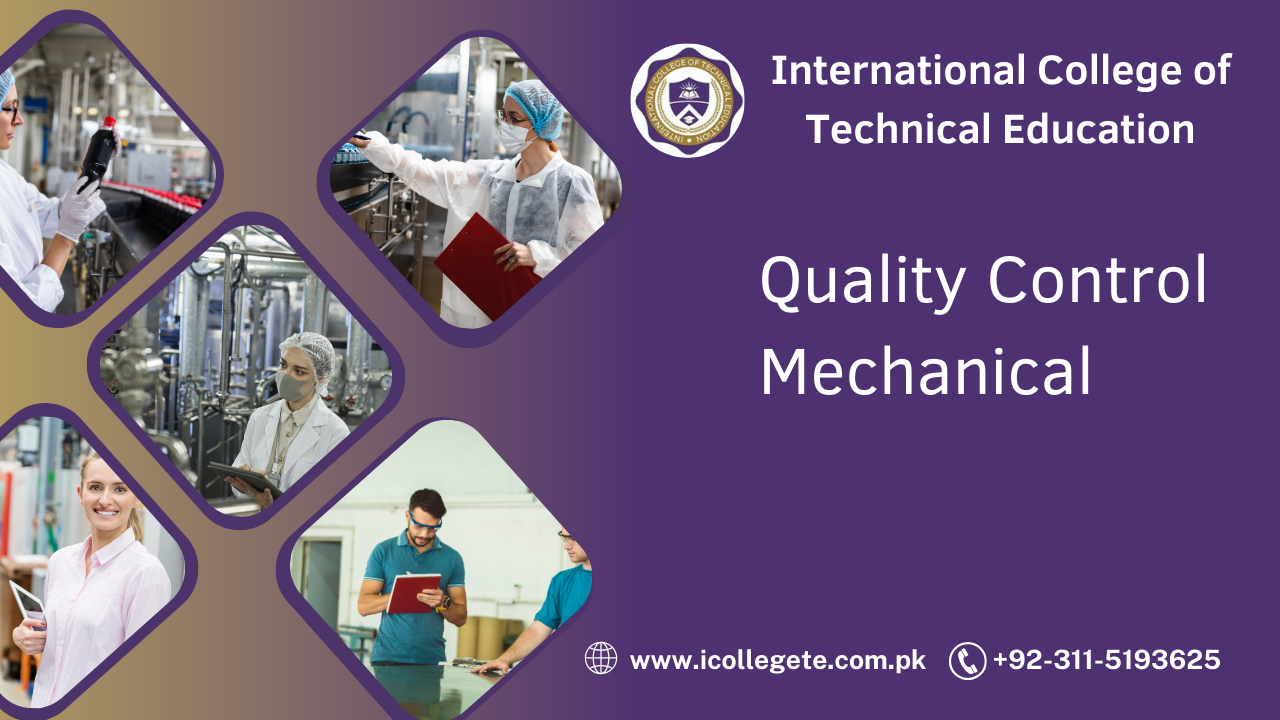The mechanical engineering field plays a significant role in various industries, from manufacturing and automotive to energy and aerospace. With the increasing complexity of mechanical systems and components, ensuring that these systems meet the highest standards of quality is crucial. This is where Quality Control (QC) in mechanical engineering comes into play. A Quality Control Mechanical Course in Faisalabad offers aspiring engineers and technicians the opportunity to specialize in maintaining and improving the quality of mechanical systems, ensuring their performance, reliability, and safety.
The Quality Control Mechanical Course is designed to provide students with the essential skills and knowledge needed to ensure that mechanical components and systems meet rigorous quality standards. The course covers all aspects of quality control, including testing, inspection, and compliance with industry standards in mechanical design, manufacturing, and assembly processes. Students will gain an in-depth understanding of the techniques, tools, and methods used to monitor and improve the quality of mechanical systems, ensuring that they function optimally and meet safety requirements.
Course Overview
This course offers a comprehensive approach to quality control in the mechanical engineering sector, covering both theoretical knowledge and practical application. Students will learn about the principles of quality management systems (QMS) in mechanical engineering, materials testing, and advanced inspection techniques used to verify the performance and durability of mechanical products and systems.
Key topics in the course include:
- Introduction to Quality Control in Mechanical Engineering: Understanding the importance of quality control in ensuring the reliability and safety of mechanical systems.
- Material Testing: Learning the methods for testing the properties of materials used in mechanical systems, such as metals, plastics, and composites.
- Inspection and Measurement Techniques: Gaining knowledge of the various tools and methods used for inspecting mechanical parts, such as precision measurement instruments, ultrasonic testing, and X-ray inspection.
- Manufacturing Processes and Quality Control: Understanding how to control quality during manufacturing processes such as machining, welding, casting, and additive manufacturing.
- Quality Management Systems (QMS): Familiarization with international quality standards such as ISO 9001 and their implementation in mechanical engineering projects.
- Problem Solving and Continuous Improvement: Developing skills in identifying quality issues, troubleshooting, and implementing corrective actions to improve mechanical systems.
By the end of the course, students will be able to apply quality control procedures to ensure that mechanical components meet required specifications, are safe to use, and perform as expected.
Study Units
The Quality Control Mechanical Course typically consists of the following study units:
- Introduction to Quality Control in Mechanical Engineering
- Fundamentals of Quality Control Procedures
- Materials Testing for Mechanical Systems
- Precision Measurement Techniques in Mechanical Engineering
- Non-Destructive Testing (NDT) Methods
- Quality Control in Manufacturing Processes
- Implementation of Quality Management Systems (QMS)
- Statistical Process Control (SPC) and Six Sigma in Mechanical Engineering
- Troubleshooting and Root Cause Analysis
- Case Studies and Project Management in Mechanical Quality Control
These units provide students with a solid foundation in both the theoretical concepts and practical techniques used in mechanical quality control.
Learning Outcomes
Upon completing the Quality Control Mechanical Course, students will be able to:
- Understand the principles and importance of quality control in mechanical engineering.
- Implement quality control procedures and techniques to ensure that mechanical components and systems meet specified standards.
- Use various measurement and inspection tools to evaluate the quality and performance of mechanical parts and assemblies.
- Understand and apply international quality standards, including ISO 9001, to mechanical engineering projects.
- Conduct materials testing and identify defects or issues that may affect the mechanical performance of materials.
- Use non-destructive testing (NDT) methods to assess the integrity and safety of mechanical systems without causing damage.
- Analyze quality problems, identify root causes, and implement corrective actions to improve mechanical system performance.
- Develop and implement a quality management system (QMS) in mechanical engineering processes to improve efficiency and reduce defects.
Course Benefits
- Specialized Skill Development: This course equips students with specialized skills in quality control, making them highly sought after by employers in mechanical engineering fields.
- Hands-on Learning: The course emphasizes practical learning, with students gaining experience using measurement tools, testing techniques, and quality management systems.
- Industry-Recognized Certifications: Students may receive certifications that are recognized within the industry, adding value to their resume and enhancing their career prospects.
- Improved Job Opportunities: With expertise in mechanical quality control, students will be prepared for various roles in industries such as manufacturing, automotive, aerospace, energy, and construction.
- Higher Earning Potential: Professionals with specialized knowledge in quality control are often compensated with higher salaries due to the importance of maintaining high-quality standards in mechanical engineering.
- Global Standards Awareness: The course provides knowledge of international quality standards, allowing graduates to work on global projects or with multinational companies.
Who is This Course For?
The Quality Control Mechanical Course is ideal for:
- Mechanical Engineering Graduates: Fresh graduates looking to specialize in quality control and improve their employability in mechanical industries.
- Mechanical Technicians: Technicians who want to enhance their skills in quality control and become experts in inspecting and testing mechanical systems and components.
- Manufacturing Engineers: Engineers working in the manufacturing sector who wish to focus on ensuring product quality during the production process.
- Quality Assurance Managers: Professionals in charge of quality management who want to specialize in mechanical engineering quality control systems and practices.
- Project Managers: Individuals managing mechanical engineering projects who need to ensure that all stages of the project meet quality standards and comply with regulations.
- Entrepreneurs: Business owners in the mechanical engineering or manufacturing sectors who wish to implement quality control systems in their companies to improve efficiency and reduce defects.
Future Progression for This Course
Graduates of the Quality Control Mechanical Course have several potential career paths and opportunities for further advancement, including:
- Quality Control Engineer: Overseeing the quality of mechanical systems, ensuring that they meet design specifications and performance standards.
- Manufacturing Process Engineer: Specializing in improving manufacturing processes, ensuring that production lines meet quality standards and operate efficiently.
- Inspection and Testing Specialist: Conducting tests and inspections on mechanical components to ensure their functionality, safety, and compliance with regulations.
- Materials Engineer: Focusing on testing and selecting materials that are suitable for mechanical systems, ensuring that they meet quality and durability requirements.
- Non-Destructive Testing (NDT) Specialist: Applying advanced testing methods to evaluate the integrity of mechanical systems without causing damage.
- Quality Assurance Manager: Managing the implementation and maintenance of quality management systems (QMS) in mechanical engineering projects or manufacturing companies.
- Project Manager: Managing large mechanical projects while ensuring that quality control procedures are followed throughout all phases of the project.
- Lean Manufacturing Consultant: Advising companies on how to implement lean manufacturing principles to improve quality control and reduce waste in production processes.
Additionally, students can further their education by pursuing advanced certifications such as Six Sigma, ISO 9001, or Statistical Process Control (SPC), which will enhance their expertise in quality management and expand their career opportunities.
The Quality Control Mechanical Course in Faisalabad is an excellent opportunity for those seeking to specialize in mechanical quality control, a field that is critical to ensuring the safety, performance, and durability of mechanical systems. With a comprehensive curriculum, hands-on training, and exposure to industry-standard tools and techniques, this course prepares graduates for exciting and rewarding careers in mechanical engineering. Whether you are a fresh graduate or a seasoned professional, the skills and certifications gained from this course will open up numerous career opportunities in industries such as manufacturing, automotive, aerospace, and energy. Quality control is the backbone of successful mechanical engineering projects, and with the right training, you can become a key player in ensuring the highest standards of performance and safety in the field.







